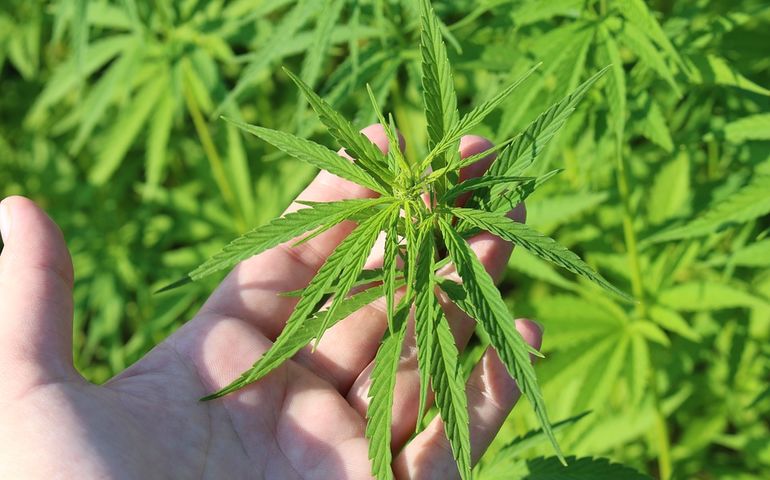Processing Your Payment
Please do not leave this page until complete. This can take a few moments.
- News
-
Editions
View Digital Editions
Biweekly Issues
- May 13, 2024
- April 29, 2024
- April 15, 2024
- April 1, 2024
- March 18, 2024
- March 4, 2024
- February 19, 2024
- February 5, 2024
- January 22, 2024
- + More
Special Editions
- Lists
- Viewpoints
- HBJ Events
- Business Calendar
- Custom Content
CT lawmakers approve hemp pilot program
 Hartford Business Journal File Photo
A cannabis plant.
Hartford Business Journal File Photo
A cannabis plant.
The state House of Representatives late Wednesday night unanimously approved a bill that will create a pilot program authorizing the production and sale of industrial hemp.
After Wednesday’s vote, Gov. Ned Lamont said he will sign the hemp bill into law in the coming days. The state Senate unanimously approved the bill last month.
Hemp is a type of cannabis plant that produces a non-intoxicating substance known as cannabidiol or CBD. It can be used for pain relief and to treat anxiety, depression, insomnia, acne and diseases like diabetes or multiple sclerosis, among other uses.
According to the bill, S.B. 893, the state Department of Agriculture (DoAG) will establish and operate a pilot program that will allow Connecticut farmers to tap into the booming commercial-hemp business, which is projected to grow into a $20 billion industry by 2020.
DoAg is responsible for licensing and regulating growers and processors and the state Department of Consumer Protection is tasked with licensing and regulating manufacturers, which is someone who converts hemp into a product meant for human consumption. Commissioners of both state agencies will need to report to the state’s environment committee by Feb. 2020 on the status of the pilot program.
The bill requires newly minted DoAg Commissioner Bryan Hurlburt to prepare the state’s hemp production plan in compliance with federal law for approval by Lamont and Attorney General William Tong. If approved, Hurlburt will submit the plan to the U.S. Department of Agriculture for final approval.
Lamont said the legal hemp program will help the state boost Connecticut’s $4 billion farming economy and create more jobs.
Hundreds of farmers have expressed interest in cultivating industrial hemp, according to industry experts. Estimates suggest cultivation could earn farmers between $40,000 to $150,000 in new annual revenue per acre.
“With this program, farmers will have the opportunity to bolster their profits with hemp, and veteran and first-time farmers alike will be attracted to a new and growing market that will offer crop diversification, increased revenue, and expertise in an expanding field,” Lamont said.
In 2014, Congress authorized states to give farmers limited hemp-growing permits for research, but Connecticut’s 6,000 farmers have been left out because the previous legislative attempts in the state didn’t meet federal guidelines. There was also uncertainty among state lawmakers regarding the cognitive effects of consuming hemp.
Almost all other states have since adopted a pilot program allowing the production of hemp.
DoAG’s efforts to launch a pilot program in Connecticut gained new life in December when Congress lifted federal prohibitions on commercial hemp manufacturing, which was illegal for decades due to its perceived likeliness to marijuana, another species of cannabis plant.
The push for a hemp pilot program in the state also gained favor earlier this year when Lamont’s proposed state budget included a bill that set a course for the legalized production and sale of hemp.
Despite Wednesday’s approval, hemp is already being cultivated in Connecticut by hundreds of students and staff at UConn. The Storrs-based hemp program is permitted for land-grant universities.
Everywhere this program has been enacted American farms are being saved. Jobs are being created. Hemp is back and is a new powerhouse for the American economy. At Sierra Gold Hemp we are growing rapidly and hiring constantly. We hope to be opening a facility in CT in the next year.

2022 Giving Guide
This special edition informs and connects businesses with nonprofit organizations that are aligned with what they care about. Each nonprofit profile provides a crisp snapshot of the organization’s mission, goals, area of service, giving and volunteer opportunities and board leadership.
Learn more
Subscribe
Hartford Business Journal provides the top coverage of news, trends, data, politics and personalities of the area’s business community. Get the news and information you need from the award-winning writers at HBJ. Don’t miss out - subscribe today.
Subscribe
2024 Book of Lists
Delivering Vital Marketplace Content and Context to Senior Decision Makers Throughout Greater Hartford and the State ... All Year Long!
Read Here-
2022 Giving Guide
This special edition informs and connects businesses with nonprofit organizations that are aligned with what they care about. Each nonprofit profile provides a crisp snapshot of the organization’s mission, goals, area of service, giving and volunteer opportunities and board leadership.
-
Subscribe
Hartford Business Journal provides the top coverage of news, trends, data, politics and personalities of the area’s business community. Get the news and information you need from the award-winning writers at HBJ. Don’t miss out - subscribe today.
-
2024 Book of Lists
Delivering Vital Marketplace Content and Context to Senior Decision Makers Throughout Greater Hartford and the State ... All Year Long!
ABOUT
ADVERTISE
NEW ENGLAND BUSINESS MEDIA SITES
No articles left
Get access now
In order to use this feature, we need some information from you. You can also login or register for a free account.
By clicking submit you are agreeing to our cookie usage and Privacy Policy
Already have an account? Login
Already have an account? Login
Want to create an account? Register
Get access now
In order to use this feature, we need some information from you. You can also login or register for a free account.
By clicking submit you are agreeing to our cookie usage and Privacy Policy
Already have an account? Login
Already have an account? Login
Want to create an account? Register





1 Comments